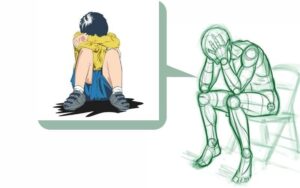It is often believed that suppressed memories are usually created by a process known as state-dependent learning.
When the brain develops a memory in a particular mood or state, especially, stress or trauma, then those memories become inaccessible in a normal state of mind.
Suppressed memories can be again experienced when the brain is back in that particular state.
However, it is a topic of controversy in psychology, whether repressed memories can or should be recovered.
Thus, in this blog, we will be talking about what is repressed memory and the signs of repressed memories. So, let’s start with describing repression.
What Is Repressed Memory?

Repressed memories can be a defense mechanism of the brain for traumatic memories.
Repression can be okay for the short term as it can avoid reoccurring traumatic memories.
However, it can cause anxiety and emotional instability in the long term.
Repression is an unconscious act and it happens without the person’s intention.
It is because repressed memories grow in extremely traumatic situations.
It is mostly observed due to childhood traumas which affect their adult life.
The concept of repression in psychology was first introduced by Sigmund Freud in his Psychoanalytic Theory.
According to him, traumatic memories existing in a person’s unconscious mind have the power to influence their behavior even in the long term.
So, the question is what are the signs of unresolved childhood trauma in adults?
Repressed Trauma Symptoms
Listed below are some signs you have repressed trauma.
#1. As a child, if you have suffered abuse from a parent or someone you loved, the brain might hide these distressing memories.
As an adult, you can become forgetful about such memories.
However, these hidden memories can cause difficulties in forming a relationship or building trust.
#2. If a toddler experiences a near-drowning experience then later in life they can develop a fear of water without remembering the repressed memories.
#3. If as an adult you suffer from any kind of speech disorder, it might be because of something buried inside your unconscious mind.
Now, let’s discuss signs of repressed memories.
Repressed Memory Symptoms
Listed below are signs you have repressed memories.
#1. One of the most common symptoms of hidden memories is insomnia. Repressed memories can cause sleep issues such as nightmares and insomnia.
#2. The sudden change of mood is another symptom of repressed memory. It causes severe anxiety disorder in some people.
#3. Lack of anger management and depression might also get experienced.
#4. Self-doubt or low self-esteem can be due to childhood trauma.
Thus, these were some signs of repressed childhood trauma in adults.
If you think you are experiencing any such symptoms of repressed trauma or memory, then you should take medical help to get treated.
Now, let’s see treatments for repression.
Treatment For Repressed Or Traumatic Memories

Newer research in psychology has proven some effective treatment for recovering forgotten and traumatic memories.
If you are opting for therapy for traumatic memories, then the therapist’s responsibility is to help the individual unwrap the long-term struggles with emotions and take the charge of their daily life.
Cognitive-behavioral therapy techniques are applied by many therapists to help you recover abusive or trauma-centered memories.
However, the therapist has to treat such patients with particular sensitivity as it is a delicate matter.
The therapy helps the person to get relief from anxiety and constant flashbacks of abusive memory.
It can help them recover from panic attacks, night terrors, and any feeling of guilt.
Now, let’s see what thoughts are on recovered memories through therapy.
Are Recovered Memories True?
The constant debate surrounding recovered memories is on their validity.
The arguments on the recovered memories are that they might get distorted and not remember the exact event that happened.
This can be because, during therapy, the therapist might influence the thoughts of the person.
Thus, memories recovered with the help of the therapist are generally referred to as false memory hypotheses.
However, in the field of Psychology recovering memory is a matter of controversy, but, it has helped millions of people overcome their fear and anxiety.
Conclusion
In this blog, we discussed the topic of repression and the signs of repressed trauma and memories.
We also talked about treatments and more.
Thus, we hope this blog could help you with your doubts about repression.

![How Does Repression Affect Memory? [Signs & Symptoms]](https://www.atoallinks.com/wp-content/uploads/2021/06/sad-woman.jpg)
